13 oct 2017
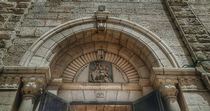
The Greek Orthodox Patriarchate of Occupied Jerusalem has been quietly selling off its properties in various parts of the country to companies hidden in tax shelters.
According to Haaretz newspaper, several properties were sold at very low prices that one wonders whether the Church is trying to get rid of its assets at any cost.
For example, an anonymous company registered in a tax shelter paid $3.3 million for 240 apartments, a commercial center and open areas in the center of Jerusalem.
The deal, for what appears to be a ridiculously low price, was made by the Greek Orthodox Patriarchate of Jerusalem, the second largest real estate owner in Israel, after the Israel Lands Authority, Haaretz said
While the reason for the numerous sales and the low price remain a mystery, three agreements obtained by Haaretz shed some light on the transactions. For example, the lands sold in Jerusalem have meanwhile been resold to another company, also registered in a tax shelter. Also, some six dunums near the Clock Tower square in Jaffa, consisting of dozens of businesses, have been sold for a mere $1.5 million and 430 dunums in Caesarea, including large parts of the national park and amphitheater, were sold for only $1 million.
All the purchasers are foreign companies registered in tax shelters, so it is impossible to obtain information about their owners. In a few decades, when the existing leases for those lands expire, their fate will be determined by those unknown purchasers.
The church bought or acquired most of its lands during the 19th century. Traditionally the Church did not sell its lands but leased them out, usually for 99 years, to public bodies like the Jewish National Fund or the Israel Lands Authority.
About six years ago, under the leadership of Patriarch Theophilos III, the Jerusalem Patriarchate made several land deals with private companies, reducing its lands considerably. As far as is known the Church has sold off most of its lands in Jerusalem and part of its lands in Jaffa, Caesarea, Ramle, Nazareth and Tiberias, as well as individual buildings and apartments in Jerusalem and Jaffa.
The first large contract appears to have been signed in 2011, when the Church leased hundreds of dunums in the Jerusalem neighborhoods of Talbieh, Rehavia and Nayot to a group of Israeli entrepreneurs named Nayot Komemiyut. About a year ago a contract was made to sell all those lands to the same group of entrepreneurs, now called “Nayot-Komemiyut Investments.” The only entrepreneur in the group who was identified was businessman Noam Ben David.
The two deals raised a panic among some 1,000 apartment owners in those neighborhoods, who risk losing their homes. Under the law, when the lease expires in about 30 years, these lands and apartments will be transferred to the new landlords and the residents will lose their property. In addition, real-estate prices in these areas have plummeted due to these deals, which makes it impossible for the residents to sell the properties.
After the Jerusalem deal was publicized, other real estate deals of the church came to light. Some Patriarchate insiders, mainly in the Jaffa and northern communities as well as in Jordan and the Palestinian Authority, were furious.
They blasted the deals as “corrupt and destructive to the Church’s status and ability to act on behalf of the Greek Orthodox community in Israel.” Recently the opponents have called for boycotting the patriarch and removing him from his post.
“We see the sale as an act of annihilating the Christian-Orthodox existence in Israel,” Victor Zakak, head of the Christian Orthodox charity organization in Jaffa said last month.
“The land has been sold to all kinds of shell companies, fictitious, non-existent bodies,” he said.
According to the sales contracts obtained by Haaretz, the church sold properties in Jerusalem’s Givat Oranim to Kronti Investments Ltd., a company registered in the Virgin Islands, for $3.3 million dollars. The properties consist of 27 dunums of land, some 240 apartments and a large commercial center. One small apartment in this area can easily fetch 2 million shekels (about $570,000 dollars).
Although the lease on this area will expire only in 52 years, the residents are already impacted by the deal.
“As soon as the deal was made public, prices dropped, sometimes by as much as 60 percent,” one of the residents said. “The property is impossible to sell. I bought the house for the full price without knowing there was any problem and now I’ll be left with nothing.”
Meanwhile the landlord seems to have changed again. Five years after the first deal the land has been sold again, this time to a company called Oranim Limited, registered in the Cayman Islands. It is not known how much Oranim paid for the land.
In another deal signed in December 2013, six dunums of valuable commercial sites near Jaffa’s Clock Tower, as well as dozens of shops and apartments on Yefet, Beit Eshel and Shimon Hatzadik streets, were sold for $1.5 million to Bona Trading Ltd., a company registered in Saint Vincent and Grenadines in the Caribbean Sea.
“This isn’t a sale, it’s a theft,” Peter Habash, an activist in the Jaffa Christian Orthodox community, said. “When you sell an asset for a fraction of its worth it doesn’t make sense.”
In August 2015, Senet Ventures inc. bought 430 dunums from the Church in Caesarea in the most expensive area in Israel, for $1 million.
According to Haaretz newspaper, several properties were sold at very low prices that one wonders whether the Church is trying to get rid of its assets at any cost.
For example, an anonymous company registered in a tax shelter paid $3.3 million for 240 apartments, a commercial center and open areas in the center of Jerusalem.
The deal, for what appears to be a ridiculously low price, was made by the Greek Orthodox Patriarchate of Jerusalem, the second largest real estate owner in Israel, after the Israel Lands Authority, Haaretz said
While the reason for the numerous sales and the low price remain a mystery, three agreements obtained by Haaretz shed some light on the transactions. For example, the lands sold in Jerusalem have meanwhile been resold to another company, also registered in a tax shelter. Also, some six dunums near the Clock Tower square in Jaffa, consisting of dozens of businesses, have been sold for a mere $1.5 million and 430 dunums in Caesarea, including large parts of the national park and amphitheater, were sold for only $1 million.
All the purchasers are foreign companies registered in tax shelters, so it is impossible to obtain information about their owners. In a few decades, when the existing leases for those lands expire, their fate will be determined by those unknown purchasers.
The church bought or acquired most of its lands during the 19th century. Traditionally the Church did not sell its lands but leased them out, usually for 99 years, to public bodies like the Jewish National Fund or the Israel Lands Authority.
About six years ago, under the leadership of Patriarch Theophilos III, the Jerusalem Patriarchate made several land deals with private companies, reducing its lands considerably. As far as is known the Church has sold off most of its lands in Jerusalem and part of its lands in Jaffa, Caesarea, Ramle, Nazareth and Tiberias, as well as individual buildings and apartments in Jerusalem and Jaffa.
The first large contract appears to have been signed in 2011, when the Church leased hundreds of dunums in the Jerusalem neighborhoods of Talbieh, Rehavia and Nayot to a group of Israeli entrepreneurs named Nayot Komemiyut. About a year ago a contract was made to sell all those lands to the same group of entrepreneurs, now called “Nayot-Komemiyut Investments.” The only entrepreneur in the group who was identified was businessman Noam Ben David.
The two deals raised a panic among some 1,000 apartment owners in those neighborhoods, who risk losing their homes. Under the law, when the lease expires in about 30 years, these lands and apartments will be transferred to the new landlords and the residents will lose their property. In addition, real-estate prices in these areas have plummeted due to these deals, which makes it impossible for the residents to sell the properties.
After the Jerusalem deal was publicized, other real estate deals of the church came to light. Some Patriarchate insiders, mainly in the Jaffa and northern communities as well as in Jordan and the Palestinian Authority, were furious.
They blasted the deals as “corrupt and destructive to the Church’s status and ability to act on behalf of the Greek Orthodox community in Israel.” Recently the opponents have called for boycotting the patriarch and removing him from his post.
“We see the sale as an act of annihilating the Christian-Orthodox existence in Israel,” Victor Zakak, head of the Christian Orthodox charity organization in Jaffa said last month.
“The land has been sold to all kinds of shell companies, fictitious, non-existent bodies,” he said.
According to the sales contracts obtained by Haaretz, the church sold properties in Jerusalem’s Givat Oranim to Kronti Investments Ltd., a company registered in the Virgin Islands, for $3.3 million dollars. The properties consist of 27 dunums of land, some 240 apartments and a large commercial center. One small apartment in this area can easily fetch 2 million shekels (about $570,000 dollars).
Although the lease on this area will expire only in 52 years, the residents are already impacted by the deal.
“As soon as the deal was made public, prices dropped, sometimes by as much as 60 percent,” one of the residents said. “The property is impossible to sell. I bought the house for the full price without knowing there was any problem and now I’ll be left with nothing.”
Meanwhile the landlord seems to have changed again. Five years after the first deal the land has been sold again, this time to a company called Oranim Limited, registered in the Cayman Islands. It is not known how much Oranim paid for the land.
In another deal signed in December 2013, six dunums of valuable commercial sites near Jaffa’s Clock Tower, as well as dozens of shops and apartments on Yefet, Beit Eshel and Shimon Hatzadik streets, were sold for $1.5 million to Bona Trading Ltd., a company registered in Saint Vincent and Grenadines in the Caribbean Sea.
“This isn’t a sale, it’s a theft,” Peter Habash, an activist in the Jaffa Christian Orthodox community, said. “When you sell an asset for a fraction of its worth it doesn’t make sense.”
In August 2015, Senet Ventures inc. bought 430 dunums from the Church in Caesarea in the most expensive area in Israel, for $1 million.
29 sept 2017

An Israeli court sentenced Yinon Reuveni, 22 to eight years imprisonment for the arson targeting the Church of Loaves and Fishes near Tiberias two years ago.
His lawyer said that he intends to appeal the sentence, and claimed that the proof of Yinon’s involvement was insufficient. The lawyer also accused the court that convicted him of making mistakes and ignoring evidence presented by the defense.
Yinon was arrested and charged with arson in July of this year, while another Israeli extremist was acquitted of all charges in the burning of the church.
The church was burned in June of 2015 in a blatant act of anti-Christian aggression. In addition to the fire, which destroyed several church buildings, the perpetrators painted anti-Arab and anti-Christian graffiti on walls throughout the church grounds.
The Catholic Church recently celebrated the reopening of the church, earlier this year.
The fire, which was set in the middle of the night in June of 2015, wounded two church members and completely destroyed one of the buildings on the site.
Hebrew graffiti was found on another building within the complex, reading ‘Idols will be cast out’ or destroyed, AFP correspondents reported at the time. The text is part of a common Jewish prayer.
The church only recently reopened, two years after the arson attack. The damage cost over a million dollars to repair, and the Israeli government in September 2015 rejected a claim for compensation by officials of the Catholic Church.
Reuveni, the only person to be convicted in the arson attack – despite evidence that multiple people were involved – is also a suspect in a number of other hate crimes against Christians and Muslims living in the Holy Land.
One of the crimes he is suspected of participating in is an arson in February 2015 against the Dormition Abbey in Jerusalem.
Asraf, who was acquitted of all charges in the arson on the Church of the Loaves and Fishes, is known to have lived in the Israeli colonial settlement of Yitzhar, where many of the Israeli extremists known to have carried out attacks against Palestinians have lived.
A third suspect, Moshe Orbach, was arrested in late 2015, accused of inciting violence against Christians and other non-Jews living in the Holy Land for writing and publishing tracts detailing the “necessity” of attacking non-Jews, and laying out the practical steps on how to carry out the attacks.
Orbach was later released.
Bentzi Gopstein, the right-wing Israeli leader of the extremist group Lehava, in 2016 reiterated the call for Jewish extremists to torch churches in the Holy Land.
His lawyer said that he intends to appeal the sentence, and claimed that the proof of Yinon’s involvement was insufficient. The lawyer also accused the court that convicted him of making mistakes and ignoring evidence presented by the defense.
Yinon was arrested and charged with arson in July of this year, while another Israeli extremist was acquitted of all charges in the burning of the church.
The church was burned in June of 2015 in a blatant act of anti-Christian aggression. In addition to the fire, which destroyed several church buildings, the perpetrators painted anti-Arab and anti-Christian graffiti on walls throughout the church grounds.
The Catholic Church recently celebrated the reopening of the church, earlier this year.
The fire, which was set in the middle of the night in June of 2015, wounded two church members and completely destroyed one of the buildings on the site.
Hebrew graffiti was found on another building within the complex, reading ‘Idols will be cast out’ or destroyed, AFP correspondents reported at the time. The text is part of a common Jewish prayer.
The church only recently reopened, two years after the arson attack. The damage cost over a million dollars to repair, and the Israeli government in September 2015 rejected a claim for compensation by officials of the Catholic Church.
Reuveni, the only person to be convicted in the arson attack – despite evidence that multiple people were involved – is also a suspect in a number of other hate crimes against Christians and Muslims living in the Holy Land.
One of the crimes he is suspected of participating in is an arson in February 2015 against the Dormition Abbey in Jerusalem.
Asraf, who was acquitted of all charges in the arson on the Church of the Loaves and Fishes, is known to have lived in the Israeli colonial settlement of Yitzhar, where many of the Israeli extremists known to have carried out attacks against Palestinians have lived.
A third suspect, Moshe Orbach, was arrested in late 2015, accused of inciting violence against Christians and other non-Jews living in the Holy Land for writing and publishing tracts detailing the “necessity” of attacking non-Jews, and laying out the practical steps on how to carry out the attacks.
Orbach was later released.
Bentzi Gopstein, the right-wing Israeli leader of the extremist group Lehava, in 2016 reiterated the call for Jewish extremists to torch churches in the Holy Land.
24 sept 2017
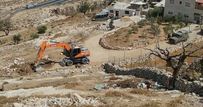
Nearly 53 mosques and churches in the occupied Palestinian territories have been vandalized by unknown perpetrators, who are believed to be extremist settlers, since 2009, according to Israeli data.
The latest of these attacks was on Wednesday and it targeted St. Stephanos Church in Beit Jamal Monastery near Beit Shemesh for the third time in five years, Haaretz newspaper reported.
The paper pointed out that many items were broken in the attack including the windows, some furniture, and a statue of the Virgin Mary.
In 2013, a firebomb was thrown at the church and hateful slogans were written on the walls, and in 2016, gravestones were vandalized in the monastery's cemetery. No suspects were arrested in the two incidents and no indictments were filed.
Haaretz said that between 2009 and July 2017, over 53 churches and mosques in the West Bank and the 1948 occupied Palestinian territories were vandalized based on data given by Israel's Ministry of Public Security.
The data show that seven people, whom identities and motives remained unknown, were convicted, while only nine indictments were filed. Around 45 cases were closed, and it is claimed that investigations in the other cases are still ongoing.
The Ministry did not present further details about the perpetrators and whether indictments were filed in each given case. However, it is likely that some extremist Jewish groups are behind these racist attacks.
According to the Hebrew newspaper, nine Christian and Islamic holy sites were vandalized in 2014 and 2015. In 2016, three similar attacks were recorded, but there were four in the first half of 2017.
01/04/16 Lehava Leader Again Calls for Torching Jerusalem Churches
The latest of these attacks was on Wednesday and it targeted St. Stephanos Church in Beit Jamal Monastery near Beit Shemesh for the third time in five years, Haaretz newspaper reported.
The paper pointed out that many items were broken in the attack including the windows, some furniture, and a statue of the Virgin Mary.
In 2013, a firebomb was thrown at the church and hateful slogans were written on the walls, and in 2016, gravestones were vandalized in the monastery's cemetery. No suspects were arrested in the two incidents and no indictments were filed.
Haaretz said that between 2009 and July 2017, over 53 churches and mosques in the West Bank and the 1948 occupied Palestinian territories were vandalized based on data given by Israel's Ministry of Public Security.
The data show that seven people, whom identities and motives remained unknown, were convicted, while only nine indictments were filed. Around 45 cases were closed, and it is claimed that investigations in the other cases are still ongoing.
The Ministry did not present further details about the perpetrators and whether indictments were filed in each given case. However, it is likely that some extremist Jewish groups are behind these racist attacks.
According to the Hebrew newspaper, nine Christian and Islamic holy sites were vandalized in 2014 and 2015. In 2016, three similar attacks were recorded, but there were four in the first half of 2017.
01/04/16 Lehava Leader Again Calls for Torching Jerusalem Churches
23 sept 2017
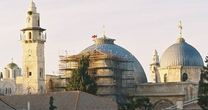
Stones from the roof of a church adjacent to the Church of the Holy Sepulcher in Jerusalem on Friday suddenly fell without causing harm to anyone, sources told the PIC reporter.
The sources explained that the construction of the church dates back to the 17th century and that the last restoration taking place in the building was a century ago.
The Israeli police closed off the area to keep worshipers away until repairs are carried out in the ancient building which is known for its archaeological and religious value.
For his part, Adeeb al-Husseini, who is in charge of the key of the Holy Sepulcher, said on his Facebook page that stones fell from the roof after nearly 50 Ethiopian worshippers had finished prayers and left the place. He added that serious damage was caused to the church but no injuries were reported.
The sources explained that the construction of the church dates back to the 17th century and that the last restoration taking place in the building was a century ago.
The Israeli police closed off the area to keep worshipers away until repairs are carried out in the ancient building which is known for its archaeological and religious value.
For his part, Adeeb al-Husseini, who is in charge of the key of the Holy Sepulcher, said on his Facebook page that stones fell from the roof after nearly 50 Ethiopian worshippers had finished prayers and left the place. He added that serious damage was caused to the church but no injuries were reported.
22 sept 2017
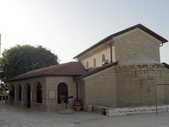
The Council of Catholic Churches in Jerusalem, on Thursday, condemned the attack against St. Stephen’s Church Wednesday night, which resulted in the destruction of internal property.
The council said, in a press release, that it demands “the State of Israel, with all its institutions concerned, punish who were responsible for such acts because it could easily lead to serious and unpredictable consequences, which would be most unwelcome in the current tense religious climate.”
Wednesday night, unidentified assailants attacked the Church of St. Stephen, which is part of the complex of Beit Jimal, a Catholic monastery run by Salesian monks in Israel.
According to WAFA, the attack resulted in the destruction of glass artwork and statues that depict the life of Jesus Christ and Virgin Mary.
The council denounced the escalation of violence and expressed its outrage after this attack and demanded the authorities to take serious measures in order to prevent such violent acts in the future.
In addition, the council prayed for a just and lasting peace in the whole region and stressed the importance of the coexistence in the holy land.
The Church of St. Stephen owes its name to the first recorded Christian martyr, who was stoned to death in Jerusalem, in 34-35 AD (Acts 6-7), and was buried in the village of Kefar Gamala.
01/04/16 Lehava Leader Again Calls for Torching Jerusalem Churches
The council said, in a press release, that it demands “the State of Israel, with all its institutions concerned, punish who were responsible for such acts because it could easily lead to serious and unpredictable consequences, which would be most unwelcome in the current tense religious climate.”
Wednesday night, unidentified assailants attacked the Church of St. Stephen, which is part of the complex of Beit Jimal, a Catholic monastery run by Salesian monks in Israel.
According to WAFA, the attack resulted in the destruction of glass artwork and statues that depict the life of Jesus Christ and Virgin Mary.
The council denounced the escalation of violence and expressed its outrage after this attack and demanded the authorities to take serious measures in order to prevent such violent acts in the future.
In addition, the council prayed for a just and lasting peace in the whole region and stressed the importance of the coexistence in the holy land.
The Church of St. Stephen owes its name to the first recorded Christian martyr, who was stoned to death in Jerusalem, in 34-35 AD (Acts 6-7), and was buried in the village of Kefar Gamala.
01/04/16 Lehava Leader Again Calls for Torching Jerusalem Churches
14 sept 2017

Father Atallah Hanna, Archbishop of the Palestinian Orthodox Church in Occupied Jerusalem, was exposed last Tuesday evening to a spitting and verbal attack by Jewish students in the Old City of Occupied Jerusalem.
A statement has been released on his official Facebook page deploring the assault and settlers’ ongoing offensive and aggressive practices against the Christian clergy in Jerusalem.
Father Hanna was assaulted after he left the Church of the Flagellation in the Muslim Quarter of the Old City on his way to the Patriarchate, according to the statement.
He was spit on and verbally attacked by male and female students of a Jewish religious school in the Old City.
“They were more than 20 people, and they started spitting first and then cursing. They shouted vulgar remarks at the Reverend Archbishop and insulted the Holy Cross and the Christian faith,” the statement said.
“Some Palestinian young men in the area provided protection for the Archbishop and prevented the fanatics from physically assaulting him,” the statement added.
For his part, Father Hanna on Wednesday denounced what had happened with him in the Old City, stressing that “no power in the world can uproot the Palestinians from their holy land.”
“Such blind extremism and hatred will only increase our ties with our holy city, which is our spiritual and national capital and an incubator for our most important holy sites,” he said.
A statement has been released on his official Facebook page deploring the assault and settlers’ ongoing offensive and aggressive practices against the Christian clergy in Jerusalem.
Father Hanna was assaulted after he left the Church of the Flagellation in the Muslim Quarter of the Old City on his way to the Patriarchate, according to the statement.
He was spit on and verbally attacked by male and female students of a Jewish religious school in the Old City.
“They were more than 20 people, and they started spitting first and then cursing. They shouted vulgar remarks at the Reverend Archbishop and insulted the Holy Cross and the Christian faith,” the statement said.
“Some Palestinian young men in the area provided protection for the Archbishop and prevented the fanatics from physically assaulting him,” the statement added.
For his part, Father Hanna on Wednesday denounced what had happened with him in the Old City, stressing that “no power in the world can uproot the Palestinians from their holy land.”
“Such blind extremism and hatred will only increase our ties with our holy city, which is our spiritual and national capital and an incubator for our most important holy sites,” he said.
9 sept 2017
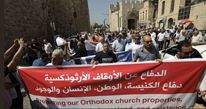
Hundreds of Palestinian Christians and Muslims demonstrated Saturday at Jaffa Gate in Occupied Jerusalem’s Old City against selling lands of a church property by the Greek Orthodox patriarch.
The demonstrators included mainly Greek Orthodox Christians who came from various cities to tell their patriarch that it was not his right to sell property that belongs to the community.
They also called for the resignation of Greek Orthodox Patriarch Theophilos III and his synod, demanding to replace the current Greek clergy with Arabs.
The demonstration came following steps taken by the Palestinian Arab Greek Orthodox community to escalate protests against the sale of church property, mainly at Jaffa Gate and in Jerusalem that went to Jewish developers and settler groups.
Quds Press quoted Udai Bajali, of the Central Orthodox Council, as accusing the Greek Orthodox patriarch with corruption and involvement in the Judaization of Jerusalem. He knew about the Patriarch’s deals from Hebrew media sources, Bajali elaborated.
He said the property in question has religious, historical and strategic value to Christians in the Holy Land and its ownership should not go to any other party.
Bajali also hoped that the Orthodox Christians would take more action in the few coming weeks in order to retrieve the properties sold to Israelis and to end such practices.
The Hebrew Calcalist newspaper, which is concerned in economic issues, unveiled on June 28 a 10.8-million-dollar deal stipulated the sale of 500 dunums of an Orthodox Church property east of Occupied Jerusalem to Israeli municipality.
The demonstrators included mainly Greek Orthodox Christians who came from various cities to tell their patriarch that it was not his right to sell property that belongs to the community.
They also called for the resignation of Greek Orthodox Patriarch Theophilos III and his synod, demanding to replace the current Greek clergy with Arabs.
The demonstration came following steps taken by the Palestinian Arab Greek Orthodox community to escalate protests against the sale of church property, mainly at Jaffa Gate and in Jerusalem that went to Jewish developers and settler groups.
Quds Press quoted Udai Bajali, of the Central Orthodox Council, as accusing the Greek Orthodox patriarch with corruption and involvement in the Judaization of Jerusalem. He knew about the Patriarch’s deals from Hebrew media sources, Bajali elaborated.
He said the property in question has religious, historical and strategic value to Christians in the Holy Land and its ownership should not go to any other party.
Bajali also hoped that the Orthodox Christians would take more action in the few coming weeks in order to retrieve the properties sold to Israelis and to end such practices.
The Hebrew Calcalist newspaper, which is concerned in economic issues, unveiled on June 28 a 10.8-million-dollar deal stipulated the sale of 500 dunums of an Orthodox Church property east of Occupied Jerusalem to Israeli municipality.
14 aug 2017
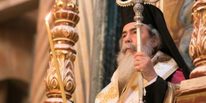
Greek Orthodox Patriarch Theophilos III said, Sunday, that a two-week old Israeli District Court ruling upholding a 99-year lease of church property in Jerusalem’s Old City, to Jewish settler organizations, is politically motivated.
Theophilos said, at a press conference in the Jordanian capital of Amman, that this legal battle, which has been going on for a decade, has resulted in an unjust decision that has ignored very clear legal evidence presented by the church, which made it clear that it was done in “bad faith, bribery and conspiracy” for the benefit of the group of settlers from Ateret Cohanim.
He said, according to WAFA, that this ruling can “only be explained as politically motivated.”
He said that 40 members of the Israeli parliament are pushing for a law which would alter the rights of the churches in Jerusalem in freely handling their property, warning that this bill, if passed, would violate international treaties and infringe on freedom of worship.
The patriarch said his church is going to appeal the District Court’s ruling, which he said will have a grave negative impact on Christian presence in the Holy Land, at the Israeli Supreme Court.
“The church will do everything within its power so that this unjust ruling will be overturned,” he said.
He called on church and world leaders to coordinate their activities and intervene to prevent this ruling from taking hold.
Theophilos said, at a press conference in the Jordanian capital of Amman, that this legal battle, which has been going on for a decade, has resulted in an unjust decision that has ignored very clear legal evidence presented by the church, which made it clear that it was done in “bad faith, bribery and conspiracy” for the benefit of the group of settlers from Ateret Cohanim.
He said, according to WAFA, that this ruling can “only be explained as politically motivated.”
He said that 40 members of the Israeli parliament are pushing for a law which would alter the rights of the churches in Jerusalem in freely handling their property, warning that this bill, if passed, would violate international treaties and infringe on freedom of worship.
The patriarch said his church is going to appeal the District Court’s ruling, which he said will have a grave negative impact on Christian presence in the Holy Land, at the Israeli Supreme Court.
“The church will do everything within its power so that this unjust ruling will be overturned,” he said.
He called on church and world leaders to coordinate their activities and intervene to prevent this ruling from taking hold.
